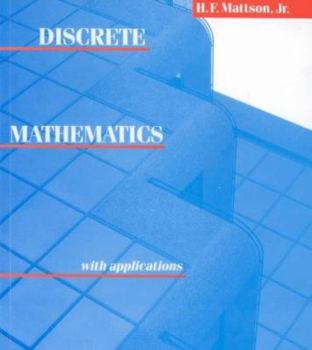Discrete Mathematics with Applications
Select Format
Select Condition 
Book Overview
Applauded by reviewers for its inviting, conversational style and outstanding coverage of logic and inductions, it introduces students to the topics and language of discrete mathematics and prepares them for future work in mathematics and/or computer science. Mattson develops students' mathematical thinking and overall maturity through careful presentation and development of proofs, numerous detailed examples and corresponding exercises and applications that allow students to make concrete use of the theory presented. Exercises are varied, ranging from simple problems to challenging extensions of the topics introduced.
Format:Paperback
Language:English
ISBN:0471606723
ISBN13:9780471606727
Release Date:January 1993
Publisher:Wiley
Length:672 Pages
Weight:2.95 lbs.
Dimensions:1.2" x 8.3" x 9.6"
Customer Reviews
1 rating
Every word in this book has a purpose.
Published by Thriftbooks.com User , 23 years ago
This is the right book for those students who want more than just passing a required course. A common complain from students is that this book is too wordy. This is because what students expect from a mathematical textbook is a sort of text in which they will hit a definition at the first line of the first page, then do one or two stupid examples, and then another definition, and so on. After one semester, students may be able to solve a half of the problems on the final, and get the credit, and then happily go back to debug their JAVA programs... We call that CS major students. Fine. But this way students lost the real reason all CS departments bother to ask their students to take math course at the first place. If CS means problem-solving, then this book gives the right ideas about where are those problems from and how to formulate those problems into better mathematics so we can solve them by computers. For example, it's not just about how to find a GCD; it is about how to convert the method we already know form our high school math into an algorithm and make the two, mathematics and computer, into one body. If you are an undergrade student majoring in CS, this book may be difficult to read at first, but it is worthwhile to spend a little more time to get used to Mattson's idiosyncrasy, and you will see a bigger picture behind the math. Although this book is not written for graduate students, it is also good for those graduates who want to make up their missing muscle for serious researches. One of the best parts of this book is its problem collection. I enjoy solving (sometimes I fail) many beautiful problems collected in this book. Good citation and further reading list at the end of every chapter. Another thing surprises me is that, I cannot find any other book at the same level that can give some serious technical terms an easy, intuitive, and *correct* explanation, e.g., the Axiom of Choice, although I do not like Mattson's opinion on infinity; but that is opinion. Enjoy the book.





